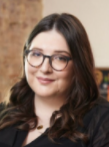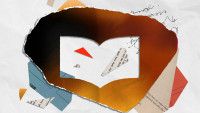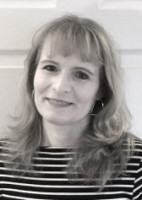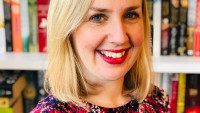
New Literary Agent Listing: Rachel Neely
firstwriter.com – Wednesday March 16, 2022

I’m looking for unforgettable and thought-provoking fiction, the kind that leaves your mind racing uncontrollably, hours after turning the last page. Whether commercial or literary, or something in between, I want authors who can match a distinctive voice with an equally compelling plot. I generally prefer darker stories; my favourite books often centre characters with tragic fates, dark pasts or buried trauma. I would also particularly like to find authors from underrepresented groups, who often bring a fresh perspective to well-worn story arcs or reflect experiences that are shared by many but, as of yet, underexplored in fiction.

How It Felt to Have My Novel Stolen
newyorker.com – Tuesday March 15, 2022

On the verge of selling my first book, I was scammed by a manuscript thief. My deepest insecurities about wanting to be a writer came rushing to the surface.
At 2:47 p.m. on September 20, 2020, I received what appeared to be an innocuous e-mail from my literary agent, Chris. Could I send over the latest version of my unsold novel-in-progress as a Microsoft Word file? “I just realized,” the e-mail read, “that I only have it as a PDF.” It wasn’t like Chris to misplace things, but the situation didn’t seem implausible. People switch computers. In-boxes get gnarly. I found an old e-mail with the Word file attached and forwarded it along.
At 3:44 p.m., another e-mail arrived: “Strange, I haven’t received anything now . . . can you resend please?” I re-forwarded the old e-mail with the Word file. At 4:03 p.m., I got another e-mail, which explained that Chris’s agency was in the process of switching servers, and perhaps this explained why my e-mails weren’t coming through. Could I try again, this time working around the problem by changing the .com suffix in Chris’s normal e-mail to .co?
Looking back, this is the part where I can’t quite understand my actions. Why didn’t I just call Chris and ask him what was going on? Here’s my best attempt at a defense. The night before, I’d been up several times, tending to my nine-week-old son, and never finding my way back to true sleep. I started on coffee sometime around dawn. When these e-mails came, I was a quivering zombie, incapable of real thought, looking only to move forward, dealing with whatever came up until the next time my son slept, when I could try sleeping, too. I was in no condition to think, only to do.
Not long after I sent the Word manuscript to the .co address, my phone rang. It was Chris. He’d been offline for a few hours, he said, so he was just now seeing that I’d sent him my manuscript twice that morning. Why, he asked, sounding more than a little bit stressed, had I done that, when he hadn’t asked me to?
I’d been scammed.

New Magazine Listing: The Coil
firstwriter.com – Tuesday March 15, 2022

Independent online literary magazine.

On navigating the publishing industry
thecreativeindependent.com – Sunday March 13, 2022

Literary agent Heather Carr discusses the ins and outs of publishing , focusing on the work you want to do, and the value of networking even if you think it's gross.
The literary world is full of various roles and duties. How did you decide to pursue the agent path?
I really like the editorial process, but I wanted the freedom to work on only the work that I wanted to work on. And I feel like being an agent, you have the most control and flexibility over who you decide to work with. There’s no one telling me I have to work with a politician I don’t like or a writer whose work I don’t believe in or don’t think needs space on the shelf, or whatever. I have the ability to curate that.
I’m also really passionate about there being more transparency as far as how the financial parts of publishing work. I get to talk to authors directly about that as an agent, about what their financial life as a writer could look like. And, I also get to help them, from a business perspective, make those financial decisions for their career and manage that. I get to be a matchmaker, and that’s probably my favorite part. You get to find a book that you know an editor will fall in love with. Being able to do that over the course of a writer’s whole career was really appealing to me. You just do everything. You don’t have to be specialized, which is nice.

I’ve Always Wanted To Publish a Novel—Here’s How I Finally Did It
theeverygirl.com – Thursday March 10, 2022

I spent the majority of my 20s doing what I think a lot of young professionals do: I woke up early, went to work every morning, and dutifully put in nine hours at my cubicle—then, every evening, I came home, cooked dinner, and tried to relax while facing a crushing sense of dread at the thought of doing that again, every single day, for the rest of my life.
Alright, that feels dramatic—but it’s how I felt, and I’m willing to bet that’s how some of you feel, too. I tried to find meaning in my work by switching industries (several times), investing in professional development, and writing freelance for various magazines, but at the end of the day, I was never satisfied, and I knew why. It was because I knew what I wanted to be doing with my life and I hadn’t yet figured out how to do it.
I wanted to be an author.

Stop, Collaborate, and Listen: Amanda Pellegrino on Writing for TV Versus Writing a Novel
lithub.com – Thursday March 10, 2022

I like to say I’m a TV writer by day and a novelist by night, which isn’t always literally true (I tend to write best in the mornings), but it gets the message across. Over the past six years as a writer’s assistant and writer, I’ve found a nice balance between these two jobs—one is solitary while the other is collaborative, one is freestyle while the other is formulaic. In both mediums, I’m building a world, creating characters, coming up with plots and twists. However, the process in which they’re executed could not be more different.
Writing books is a one-woman job. While writing my debut novel, Smile and Look Pretty, I was between TV gigs, so I scheduled my entire day around working on the book. Since I’m most productive in the mornings and evenings, I’d wake up around 8:30 and write until noon. I wouldn’t count words or set any kind of goal aside from typing until my alarm went off. Then I’d take a mid-day break and go for a long run in Central Park, usually listening to music or a true crime podcast. That helped me refresh and come back to the book with new eyes. In the afternoon, I worked from a coffee shop and wrote until around 6 or 6:30 before calling it a night. There were definitely days when the only person I spoke to was my barista.

New Publisher Listing: AdventureKEEN
firstwriter.com – Thursday March 10, 2022

A nonfiction publisher of books on a wide range of subjects, including adventure, outdoors, travel, nature, local history, sports, and more.

New Literary Agent Listing: Joanna Kaliszewska
firstwriter.com – Thursday March 10, 2022

Looking for all types of fiction but particularly interested in reading group, upmarket commercial, literary, crime and thriller.

Blake Friedmann to launch online open week for writers
thebookseller.com – Tuesday March 8, 2022

Literary agency Blake Friedmann will opens its virtual doors next week, with a series of events dedicated to “demystifying” publishing and agenting and to supporting writers seeking representation.
Beginning on 14th March, the agency will host a week of live #AskAgent sessions, top tips videos, agent blogs and book giveaways running across Twitter, Facebook and Instagram.
The agency said it aims to offer “insights and transparency” with key focuses into how book deals work, how to navigate the submission process and find an agent, how an author and agent work together, understanding the publication process, and earning income as an author.

Why Aren’t You Selling—Enough?
By G. Miki Hayden
Instructor at Writer's Digest University online and private writing coach
firstwriter.com – Monday March 7, 2022

I went to the bank with a nice big check last week amounting to hundreds of dollars for a short story. That will wake you up. It woke me up. I thought all bank transactions were electronic these days. (A wee joke, but, yes, I received the money.)
I don’t always sell stories for that much, but I’ve been selling steadily over the years—stories if not novels—and I sell to some good publications. I also appreciate glowing rejection letters.
Get the free newsletter | Submit a news item or article | Get Writers' News for your website





